Mulberry on verge of extinction from Rajshahi region

Mulberry fruit, which was very favorite and attractive fruit among children and old aged people alike in the Barind region of Rajshahi, is now being obliterated because of absence of cultivation of fruit-bearing Mulberry plants.
Once at the heyday of silkworm rearing and production of silk yarn by thousands of poor, landless farmers in hundreds of villages of Barind region of the district, Mulberry trees of fruit bearing varieties used to be cultivated at the courtyard, fallow lands of the farmers and beside the roads.
Children, young men and women and even elderly aged people enjoyed eating the red-yellow and black coloured Mulberry fruits grown in bunch like grapes and tasted sourly-sweet. The Mulberry fruit bears almost all types of vitamins and minerals. Among fifty varieties of Mulberry plants, seven to eight varieties bear fruits of decent, edible quality.
Under five regions of Bangladesh Silk Board (BSB), Mulberry is commercially cultivated through 164 sub-centres, 40 centres and 10 zones. In addition, mulberry is also cultivated independently under Bangladesh Silk Research and Training Institute(BSRTI), Sopura Silk Mills Limited and BRAC also cultivate mulberry plants.
According to sources, Mulberry intruded into the country from Thailand. Later on it spread to India( Bangladesh) and almost all countries of Asia and in African countries, Europe and USA.
Dr M Monjur Hossain, Professor of the department of Botany of RU while talking to this correspondent informed, there are several varieties of mulberry trees at the Botanical garden of Rajshahi University. Mulberry fruit contains various types of vitamin including Vitamin-C, A, Calcium and Carotene. Varieties of tasty, aromatic jam, jelly and juice are prepared from mulberry fruit. He said, he has tasted Mulberry fruits in various countries but Bangladeshi one is the most palatable and tasty. An official of of Sopura Silk Mills Limited informed once poor, distressed people, specially women folks used to plant mulberry trees at their court yards and fallow lands and used to cultivate silk worm and extract silk-yarn from the cocoon.
Thousands of families called ‘Bosnis’ used to adopt their livelihood on mulberry cultivation, silk worm rearing and silk yarn reeling. They used to cultivate local varieties of mulberry trees which used to bear edible fruits.
But, later on, the cultivation of mulberry as well as silk-worm waned and people inclined to hybrid varieties, non-fruit bearing Mulberry plants and trees.
An official of Agriculture Extension Department, Rajshahi informed, in Bangaldesh local varieties of Mulberry is cultivated. Most of the Mulberry is cultivated in Rajshahi, Chapainawabganj, Natore, Sirajganj, Thakugaon, Dianjpur and other districts. Mulberry fruit might again become a favorite fruit in Bangladesh and may be commercially cultivated.



